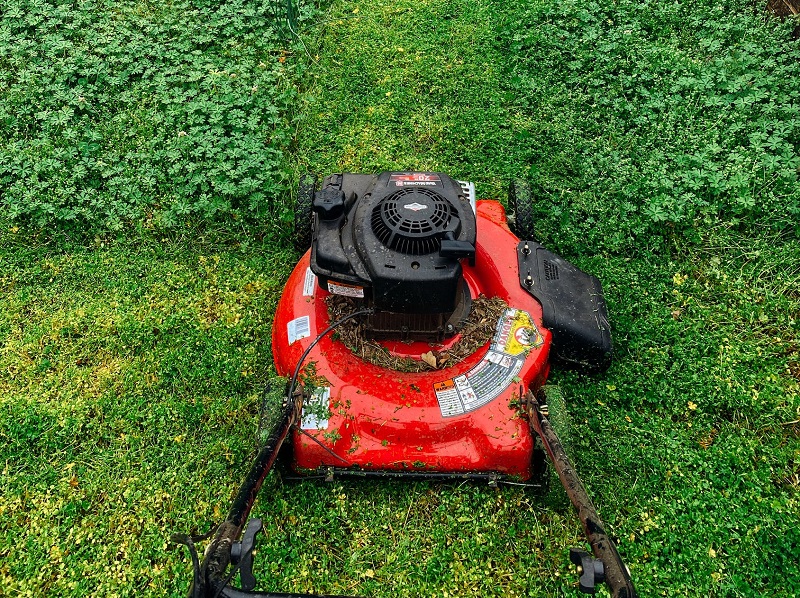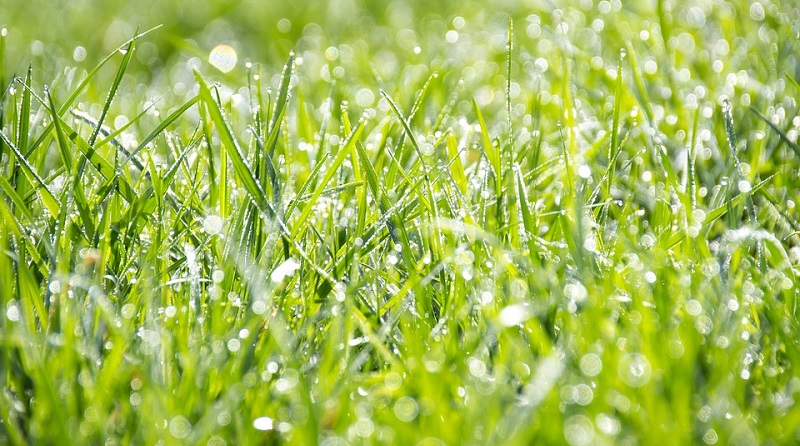You want to get the grass cut, but it has rained on the one day you have off work this week. We’ve all been there and it’s darn frustrating. There’s part of you that thinks you should wait. But for how long? Then there’s part of you that thinks you should pull the lawn mower out of the garage right now and get to work. But will mowing wet grass ruin your lawn mower?

Will Mowing Wet Grass Ruin your Lawnmower (The Short Answer)
Will mowing wet grass ruin your lawn mower? Short-term, no, but long-term, then definitely yes. With repeated exposure to moisture and water, a lawn mower will start to show signs of wear both from the additional workload wet grass creates and from corrosion. Here are several problems you may encounter.
- Lawn Mower Corrosion
- Additional Engine Stress
- Overheating
- Clogged Bagger Chute
So…Will Mowing Wet Grass Ruin Your Lawn Mower…Eventually?
This is a better question to ask. Wet grass is unlikely to be the end of your mower right away, but eventually, if used repeatedly in these conditions, it will likely lead to your mower giving up the ghost long before it really should.
If you’re not sure why this is, we’re going to talk you through what happens when you cut wet grass, and why this puts extra pressure on your mower. Here we go…
- Mower Deck is Caked in Clippings – And I really do mean caked. As soon as the blade cuts through wet grass, the clippings will stick to the underside of the deck like they are magnetized or something. You likely won’t even be able to see the deck after you’ve made a few passes of your lawn, as the coating of clippings will be too thick. Why is this bad? Well, apart from making your mower heavier, it also makes the blade’s cutting motion far less effective, which leads us on to our next point…
- Engine or Motor is Forced to Work Harder – To compensate for the fact that your mower’s blade is no longer cutting as effectively as it should, the engine (if it’s a gas mower) or motor (in the case of an electric motor) has to work extra hard to get the job done. This extra stress often leads to a shorter lifespan (and with it being such a vital component, replacement is usually prohibitively expensive). We’ve heard stories of motors on cheaper electric mowers burning out in just a few short weeks when continually tasked with mowing wet grass. A higher-quality gas engine should fare a lot better, but its lifespan will still likely be shorted. Why suffer those consequences if you don’t have to?!
- Moisture Leads to Corrosion – This might be blatantly obvious, but it’s something that a lot of yard owners overlook if they have a gas mower. The moisture from your grass may get into the fuel tank, and if you haven’t mixed in a stabilizer, it will likely corrode. The same goes for the deck if it’s a metal deck. If the underside is not cleaned up and freed of wet clippings after you’re done mowing, it will likely lead to corrosion.

Other Dangers Wet Grass Poses to Your Lawn Mower
- Using a Corded Electric Mower Can Be a Fatal Mistake – It’s well known that electricity and water should not be mixed. Rainwater, the stuff that your grass is coated in, conducts electricity. So if either the power cable or the extension cable that your mower is connected to is damaged, even just a little, and the electrical wiring is exposed, this would be bad news for both you and your mower. The mower could short circuit, and worse still, you could be electrocuted. So, if you’ve got a corded electric mower, it stays in the shed when the grass is wet!
- A Haven for Mold – Remember we said that the underside of the deck gets absolutely caked in clippings when you mow wet grass? Well, you’ll want to clean them off as soon as you’ve finished mowing for two reasons. Firstly, if you don’t clean them off while they’re still wet, they’ll dry out and form a solid layer that you’ll need to chisel off. But secondly, and more importantly, if you don’t clean them off, apart from providing optimum conditions for corrosion of the deck, you’re also creating the ideal environment for mold growth. And boy will that pong if it’s left to fester in a garage or shed for a few weeks!
I think we’ve probably highlighted sufficient negative impacts of using your lawn mower on wet grass in this post that you should know to avoid doing so unless you have absolutely no other option. And if you don’t care much about your yard-crawling friend (aka the mower), think about the negative implications mowing wet grass can have for your lawn (uneven cut, ugly looking tire ruts that need fixing) and your own personal safety (falls and slips are more common, particularly on slopes).
How to Protect Your Mower If You Do Mow in Wet Conditions
Sometimes it can be difficult to avoid mowing in wet conditions as we usually only have limited time and opportunity to mow. So what can you do to protect your lawn mower? Here are some tricks I use to prevent harming my lawn mower when mowing wet grass.
Protect the Lawn Mower Before Heading Out in the Wet
There are three products that I like to use If I’m considering mowing my lawn when it’s wet.
- WD-40 Dry Lubricant
- WD-40 Regular
- Belt Dressing
I use the WD-40 Dry Lubricant under the cutting deck to protect the lawn mower from long-term exposure to water and help me avoid deck repairs and deck rust. At the same time, these types of PTFE sprays help to stop grass from sticking to the deck.
For the rest of the lawn mower, like the metal parts of the engine, levers, and various nuts and bolts, I use a regular WD-40 spray. This is definitely my go-to product to prevent any type of rust on exposed metal on my lawn mower.
Finally, the last part of the lawn mower that I want to keep the moisture away from is my drive belt and my deck belt. While water isn’t going to damage a belt, it will wash away any belt dressing which can lead to problems like belt stretching or snapping before their time. So, if you are going to mow the grass while it is wet, then be sure to use a good quality belt dressing, or at least consider using a homemade alternate belt dressing.
Clean Down the Lawn Mower after Mowing in Wet Conditions
When I have finished mowing a wet lawn, I always make sure to give my lawn mower a good cleaning and then try to get the lawn mower as dry as possible. Usually, a garden hose and a leaf blower are all you need to wash and dry the lawn mower. When I’m finished cleaning and drying, I grab my WD-40 Dry lubricant, regular WD-40, and belt dressing and repeat the steps from above to give my lawn mower that extra protection and ensure it is ready for the next cut, no matter if it’s going to be wet again or dry. I’m pretty sure that if you follow these few steps, you’ll never have a problem with rust or corrosion on your lawn mower.
What Other Problems Does Mowing Wet Grass Cause?
So it is ok for your lawn mower to get wet, and it’s pretty clear what problems can be caused to your lawn mower if you have to mow wet grass. But what other damage might you be causing when you mow wet grass? Here’s a quick list of other things to consider when asking yourself, will mowing wet grass ruin your lawn mower?


Leave a Reply